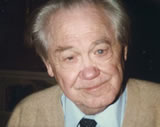Reflections on "The University and the Community of Learning"
By Paul Keane, M.A., M.Div., M.Ed.
Read the Speech
Read the speech Henry Steele Commager gave at Kent State University.
It was April, 1971 and the word around campus was that Henry Steele Commager was going to speak in U. Aud., as we called the Kent State University Auditorium, on Saturday or Sunday afternoon. I was told by people in "the know" to go if I wanted to hear something special. I didn't know who Henry Steele Commager was but I had been told he had at first turned down the invitation to speak at Kent State, saying "No one there would be interested in what I have to say."
It was the year after the infamous shootings whose carnage I had witnessed the preceding May. During the intervening time the campus had been quiet except for one notable professor,a few of the nine survivors who had been shot, and a handful of courageous Yippies who protested the local kangaroo grand jury which indicted, not guardsmen, but students and faculty for the shootings. Shamefully, I too had been silent about the killings in my role as a graduate student and dorm counselor. I rationalized, "Surely Nixon will convene a federal grand jury to investigate this correctly." In August, four months after Commager's speech, Nixon proved me naive, when Attorney General John Mitchell announced there would be no federal investigation. Kangaroo justice would apparently be the last word.

Henry Steele Commager
Commager had refused the invitation to a campus where freedom of expression had not only been chilled by the student and faculty indictments, but frozen by fear that the Ohio legislature would act on some of its members' threats to close Kent down permanently if there were any more demonstrations.
Robert I. White, President of the University then (and at the time of the shootings), to his credit, sent Commager a telegram in latin saying, "Come and speak the truth."
Come he did. "The University and the Community of Learning" was his truth.
I went to U. Aud. that April 10th hoping that Commager's truth would amount to a dressing down of the local Portage County grand jury and its obvious prejudice. What I got instead was a speech which placed my current local Ohio moment in the context of 800 years of the history of academic freedom.
Suddenly I was overwhelmed with my own sense that silence on my part was more than cowardly, it was a betrayal of something precious, a tradition whose flame had been kept burning solely by the protective walls of the Academy.
My silence - our silence at Kent State - jeopardized that flame. I left that auditorium resolved to await my opportunity, and when it came, to speak.

Henry Steele Commager
When Mitchell refused to convene a federal grand jury in August, I returned to Kent in September and mounted a student and faculty petition to Nixon to reverse that decision. A lot of others wanted to speak too and 10,000 signatures were gathered in only ten days, including that of co-author of the petition, Greg Rambo, president of the Kent State Young Republican Club and, in an ironic twist of fate, a former page to the very Ohio Governor who sent the troops to Kent State in 1970, James A. Rhodes. Kent State's new president, Glenn A Olds, personally brought the petitions to the White House. Six years later, while a divinity student at Yale, I persuaded Yale's library to begin a Kent State Collection in its Manuscripts and Archives division to house manuscripts and documents which I believed could not be housed impartially at Kent State's library. That Collection still exists at Yale and still generates controversy.
Both of these projects (the petition to Nixon and the Kent State archives at Yale) were inspired by Henry Steele Commager's speech that day. In the year 2007, as I re-read its words, I believe it to be one of the great speeches of the 20th Century.
As we now plunge into a digital world and a world replete with genetic engineering and its attendant dreams and nightmares let us hear again the words of Professor Commager: "The university - and the scholar - have in addition one function which is bound to excite misunderstanding and hostility in society; that is to serve as the conscience and critic of society and of whatever establishment is in power." May it long continue to do so.
